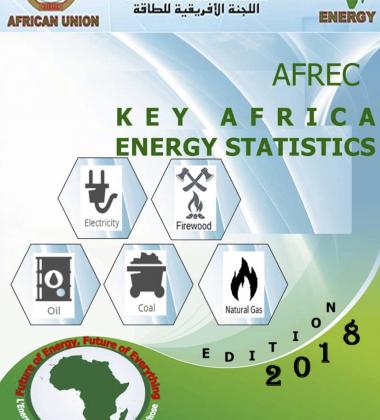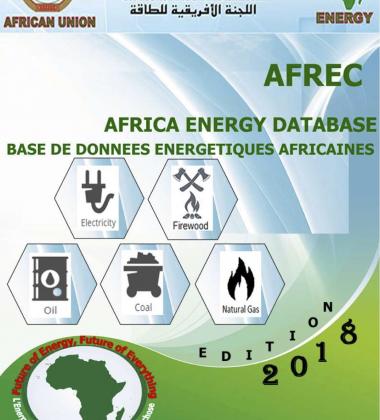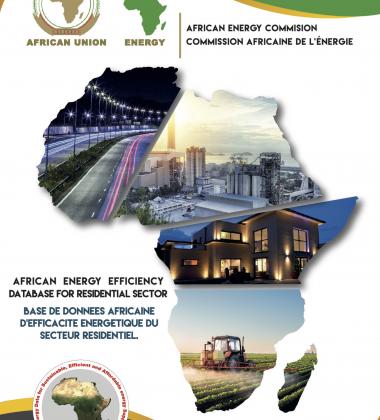Bioenergy Programme
1. Introduction:
Many African countries are reliant on traditional bioenergy consumption to fulfil energy demands, and the percentage of solid fuel use (charcoal and firewood) in the region is the highest in the world. In 2016, the bioenergy consumption in Africa represented 50% of the total final consumption, which almost was 133 Mtoe. In countries like Niger, Nigeria and Senegal, for example, firewood and charcoal represent 96%, 80% and 82% respectively of residential energy consumption (AFREC Energy Efficiency Indicators 2018).
Production and consumption of bioenergy has direct impacts on biodiversity, water and soil quality, as well as on a number of social and economic aspects of primary relevance for developing countries. In particular, for Africa, household air pollution from traditional cook stoves has a large impact on health, production of solid biomass impacts natural forest ecosystems, and lack of modern energy services can negatively impact social and economic development.
However, in many countries, data collection is marred by a number of problems, including weak sectoral establishment and lack of financial, institutional and human capacity. Improving data collection and analysis is key to monitoring bioenergy sectoral trends over time, evaluating sustainability, and developing sound policies.
AFREC has launched the African Energy Information System (AEIS) since 2012 in order to improve the quality of energy databanks and information systems available in Africa. However, data is still dependent on national capacity for data collection and statistical analysis, which is lacking. Therefore, a sound planning that balances the different policy objectives and bioenergy pathways in light of specific country conditions and needs will effectively enable bioenergy to contribute to low carbon development and building green economies.
During the implementation of this programme, national stakeholders will be brought together to analyse the concept of bioenergy sustainability and its implications. The results of the country data collection and analysis will be used at the national and regional level to better understand the impacts of bioenergy and increase the national capacity in building robust systems for bioenergy reporting and monitoring as well as recommending the required national policies that a country can implement.
2. Programme Description:
Through the use of sustainability indicators for bioenergy (GSI) and related FAO best practices, the programme will provide technical support and build capacity of relevant institutions of the beneficiary countries to measure/collect, analyse and monitor bioenergy data. This will enable them to track the environmental, social and economic impacts of their bioenergy production and consumption, particularly the actual contribution to GHG emission reductions by replacing fossil fuel and traditional biomass use while harnessing socio-economic co-benefits. Specifically, the programme will strengthen the institutional capacity and data basis in the target countries to measure and analyse impacts by implementing the GSIs, and use them to inform planning processes and policy revisions.
Moreover, the programme will contribute to strengthening the ability of the beneficiary countries to adapt to the negative effects of climate change, as it provides the basis for better planning and management of resources, including soil, water and land use. The programme will make tailored policy recommendations that promote bioenergy pathways that are in line with adaptation needs, and support the countries in transforming these recommendations into effective policies. This should set the basis for the development of effective integrated policies for sustainable bioenergy as a part of low carbon and climate-resilient development strategies at the national and regional levels.
Furthermore, the programme will extract and analyse lessons learned from the implementation of the GSIs, and facilitate exchange and learning through regional training seminars, establishing a community of practice for sustainable bioenergy.
Phase 1 of this programme will include up to 15 countries (depending on fund mobilisation) with the highest production and consumption of bioenergy as per AFREC statistic 2018. The phase 1 focused countries are Nigeria, Ethiopia, Congo DR, Uganda, Kenya, Mozambique, Cote d’Ivoire, Zambia, South Africa, Zimbabwe, Madagascar, Sudan, Burkina Faso, Tanzania and Ghana . Phase 1 will be followed by a series of subsequent Phases to include more African countries in each phase.
The estimated cost of phase 1 of the programme (to include 15 countries) is USD 12 million. This budget is expected to include staff costs (including local and international consultants that will work on data collection and analysis), travels (including for participants in regional events aimed to share lessons learned from the implementation of this project), national workshops and regional workshop. Detail estimation of project cost will be develop later based on selected countries.
The implementation period of phase 1 of the programme is expected to 24 – 36 months.
A fund rasing action plan will be developed and carry out through bilateral communication and through special events organized specifically for fund raising. Bilateral discussions are planned to take place between AFREC/FAO and institutions and development partners.
3. Objectives of the Programme:
The objective of the programme is to improve and enhance the capacity of the African countries to measure/collect and analyse bioenergy data and establish a strong system of continuous monitoring through the implementation of the Sustainability Indicators for Bioenergy (GSI) and related FAO best practices. The programme will also propose tailored recommendation and policies that the individual country can implement to improve the monitoring and sustainability of bioenergy production and consumption. The programme aims to:
a) Improve the capacity of beneficiary countries to collect, analyse and monitor bioenergy data;
b) Assess and enhance the capacity of beneficiary countries to measure the GSIs and use them to inform bioenergy policymaking;
c) Set the basis for a national platform for the long term monitoring of bioenergy sustainability in the beneficiary countries;
d) Develop tailored recommended policies for each beneficiary country to improve the monitoring and sustainability of the bioenergy production and consumption and provide support for implementation; and
e) Advise policy makers and engage stakeholders on best practices in bioenergy in order to maximize sustainability and contribute to adaptation to climate change.
To achieve this, the programme will:
a) Assess data availability and human and institutional capacity;
b) Familiarise stakeholders with the indicators and key associated concepts;
c) Tailor methodologies for measuring the indicators to country conditions;
d) Define a data collection strategy and fill major data gaps;
e) Establish baseline values for the indicators;
f) Identify training needs and build capacity for continuous monitoring;
g) Facilitate multi-stakeholder discussion of baseline indicator values and their implications for policy objectives over the coming years;
h) Developed tailored recommendation and policies for the beneficiary countries; and
i) Support beneficiary countries in transforming policy recommendations into effective policies.
4. Recommendation:
Support the implementation of the programme and urge the African union, AFREC and selected Member States to allocated the required resources for implementation;
Key Resources
- August 20, 2012
- April 01, 2012
- February 01, 2012
- November 01, 2011
- October 01, 2011
- July 01, 2011
- April 01, 2011
- January 01, 2011







